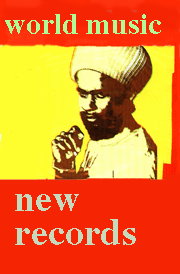Welcome to my "New World Music" page, which highlights new(ish) African, Asian, Latin American and Celtic records, and "miscellaneous" records that I had the good fortune to check out in Summer, 2013. This page is added to as new records come in... If you want more to read more reviews, many others are archived nearby, and there are separate sections for various kinds of world music that you might like exploring as well.
Recommended Records: Summer, 2013 | Review Archives | World Music Index
The Bats "Free All The Monsters" (Flying Nun)
Hamilton De Holanda & Andre Mehmari "GismontiPascoal" (Adventure Music)
The Garifuna Collective "Ayo" (Cumbancha)
Gitango "Zingaros" (ARC Music)
Vasco Hernandez "Luz De Otra Manera" (ARC Music)
Joji Hirota "Japanese Folk Songs II" (ARC Music)
George Kainapau "Hawaii's Falsetto King" (Hana Ola)
Pedro Martins "Dreaming High" (Adventure Music, 2013)
Danny Michel & The Garifuna Collective "Black Birds Are Dancing Over Me" (Cumbacha)
Rosa Passos "Samba Dobrado: Cancoes De Djavan" (Universal)
Ricardo Silveira & Roberto Taufic "Atlanticos" (Adventure Music, 2013)
Zoot Sims "New Beat Bossa Nova, v.1-2" (American Jazz Classics)
Benjamin Taubkin & Adriano Adewale "The Vortex Sessions" (Adventure Music)
Chucho Valdes "Border Free" (Jazz Village)
Various Artists "THE EVOLUTION OF SKA" (Jasmine)
Various Artists "THE ULTIMATE GUIDE TO SPANISH FOLK" (ARC Music)
PLUS:
Connie Evingston "Sweet Happy Life" (Minnehaha Music)
Leonard Kwan "The Legendary Leonard Kwan: The Complete Early Recordings" (Hana Ola)
The Psychedelic Aliens "Psycho African Beat" (Academy Records)
Various Artists "ANCIENT HULA HAWAIIAN STYLE" (Hana Ola)
Various Artists "69 CHANSONS EROTIQUES" (Marianne Melodie)
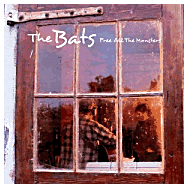 The Bats "Free All The Monsters" (Flying Nun, 2013)
The Bats "Free All The Monsters" (Flying Nun, 2013)


For over three decades, New Zealand rock pioneers The Bats have maintained their faith in simple, emphatic, guitar-based power-pop, crafting album after album of gauzy, melody-driven gems. This record is another winner, with a brace of alluring, half-droning, half-propulsive, kiwipop anthems, the kind of record that I, personally, enjoy cranking up to eleven, and letting the grooviness wash over me. Robert Scott's voice and the band's comfortable chorus, and especially the ease with which they collaborate and the clarity and simplicity of their songs... It's pure indiepop catnip! For a while there, a decade or two ago, the band got a little jittery sounding, but they have definitively retuned to the mellower, mystical, velvety hypnosis of their classic mid-'80s albums and with the exception of one woeful misfire, this record is another quiet masterpiece to notch on their belt. Skip track #5, then pump up everything else, and you my friend will be in Batsy heaven.
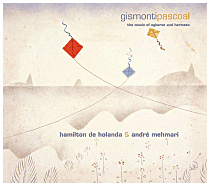 Hamilton De Holanda & Andre Mehmari "GismontiPascoal: The Music Of Egberto And Hermeto"
(Adventure Music, 2013)
Hamilton De Holanda & Andre Mehmari "GismontiPascoal: The Music Of Egberto And Hermeto"
(Adventure Music, 2013)


This dual homage to Brazilian jazz experimentalists Egberto Gismonti and Hermeto Pascoal features brisk duets between pianist Andre Mehmari and mandolinist Hamilton De Holanda, with contributions (on one song apiece) by Gismonti and Pascoal themselves. As befits the original artists, this is both cerebral and soulful, perhaps a little inaccessible even to many mainstream jazz fans, but rewarding to those who are into it, and more accessible in some ways than the Gismonti and Pascoal originals. The title track, "GismontiPascoal," is -- as you might imagine -- a fusion of their two divergent styles, Gismonti's interior explorations and Pascoal's chaotic explosivities. The younger musicians seem to be enjoying themselves, particularly when given a chance to play with their grizzled, oddball musical idols. A challenging exploration of music that is both at the fringes of Brazilian jazz, and at its very heart.
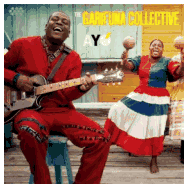 The Garifuna Collective "Ayo" (Cumbancha, 2013)
The Garifuna Collective "Ayo" (Cumbancha, 2013)


(Produced by Ivan Duran)
A gorgeous set of new music from the Garifuna people, a unique ethnic enclave from the Caribbean coasts of Belize and several other Central American countries. The Garifuna culture is a mix of West African, Carib (native Antillean) and Arawak Indians, with a heavy dose of old-world West African traditions actively alive in their modern-day society. In recent years the Garifuna popular music has become a focal point for retaining and reclaiming their language, which has been on the brink of extinction for decades. One of Garifuna music's biggest stars, Andy Palacio, passed away several years ago, but here the Collective picks up where he left off, crafting a sleek, multi-textured world-pop set that reveals many influences -- a heavy layer of West African guitar pop -- highlife and juju in particular, along with subtle hints of reggae, and a newfound droning style that suggests they may be absorbing new ideas from international artists such as the sub-Saharan Tuareg band, Tinariwen... Like most styles, Garifuna music is syncretic and ever-changing, and this well-produced album spotlights a dynamic group that is pleasantly modern, offering songs that stand on a par with any other dance-pop in the world. Definitely worth a spin!
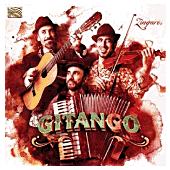 Gitango "Zingaros"
Gitango "Zingaros"
(ARC Music, 2013)


A lively, emphatic mix of sultry Latin American tango and fiery Romany (gypsy) jazz and flamenco... This cheerful trio makes a big sound, and do a lot to enliven the contemporary gypsy repertoire... They sound pretty fluid and not too severe, nor too caught up in the big emotional sweep of traditional tango, allowing a more immediate, ecstatic feeling to come through. Worth a spin, for sure.
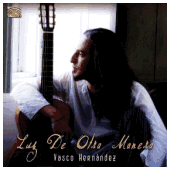 Vasco Hernandez "Luz De Otra Manera" (ARC Music, 2013)
Vasco Hernandez "Luz De Otra Manera" (ARC Music, 2013)


(Produced by Vasco Hernandez & Tiago Inuit)
Spanish guitarist Vasco Hernandez, raised in Madrid and now living in Barcelona, is a vibrant modern artist, taking classic flamenco away from the predictable juggernaut-style pop production of recent years into a more expansive, expressive, unpredictable direction. This album features ten original songs, each crafted with unusual, frequently shifting rhythms and vivid guitar improvisations. In much the same way that Portuguese fado has been revitalized by a younger generation, Hernandez and his cohorts are taking flamenco into a dynamic new direction. Tradition is not neglected, but these restless, searching performances are inventive and fresh, equally appealing to fans of jazz, Latin music and acoustic guitar music. A nice one.
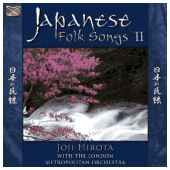 Joji Hirota "Japanese Folk Songs II" (ARC Music, 2013)
Joji Hirota "Japanese Folk Songs II" (ARC Music, 2013)


Listeners drawn to the "folk songs" part of this record may be surprised by the classical orchestrations, written by Joji Hirota and performed by the London Metropolitan Orchestra, and those drawn to Hirota's name may be disappointed that this East-West collaboration doesn't include any of his thunderous taiko drumming, although the crossover aspects of the album won't be too big a shock to fans who are familiar with his multi-traditional artistic approach. This performance, which includes several folk tunes, some Japanese children's songs and new original material from Hirota, is in part a memorial to the losses of the 2011 Sendai earthquake and tsunami which devastated Northern Japan. Hirota sings and plays shakuhachi flute, and hosts a children's chorus made up from schoolkids from the areas damaged by the tsunami. Some of the opening numbers may be a bit jarring: the orchestrations struck me as a bit Copland-esque, though more traditional Japanese motifs become more dominant in the album's second half. Perhaps not as plangent and plaintive as we are used to hearing, but certainly an intriguing take on this material.
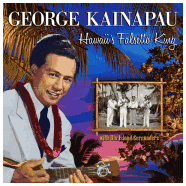 George Kainapau "Hawaii's Falsetto King" (Hana Ola, 2012)
George Kainapau "Hawaii's Falsetto King" (Hana Ola, 2012)


This archival recording is a real treat for fans of old-school Hawaiian hapa haole pop, documenting an entire April, 1957 nightclub performance by legendary high-falsetto singer George Kainapau. The show was home-taped by J. Douglas Miller at Waikiki beach's recently-opened Kaiser Hawaiian Village Hotel, where Kainapau held down a regular gig along with guitarists Sonny Kamahele and Charles Kaipo Miller and steel player Jules Lee Ah See, veteran players who like many Hawaiians of the era adapted themselves to the Vegas-y, pop-oriented demands of the booming '50s hotel scene. The performance is lighthearted but professional, and this casual, amateur recording captures the mix of weary professionalism and warmhearted bonhomie that these old pros brought to what probably wasn't a very challenging gig. We hear some side chatter, clinking glasses, corny stage patter and moments of sincerity and grace mixed with some clearly self-aware corniness. Although Kainapau is best known as a master of the often-lofty Hawaiian falsetto style, here he mostly sticks to a lower register and a more conversational style, mixing a few older mele chants and ballads with a ton of exotic-themed novelty numbers, including the risque "Keep Your Eyes On The Hands" and evergreens such as "Little Grass Shack." Ah See and Kamahele also worked in headliner Alfred Apaka's band, and at the end of his set, '30s star George Kainapau tells his audience to check out the younger, blander, more popular Apaka in the larger upstairs lounge, another detail anchoring this performance in its time, an era when the giddy faux-exotica of hapa-haole novelty songs had drifted into a the more generic, pop-oriented world of '50s nightclub shows, and the great Hawaiian cultural revival was still just around the corner. A great chance to hear a legendary performer delivering a jovial, relaxed performance in his later years.
![]() Pedro Martins "Sonhando Alto/Dreaming High" (Adventure Music, 2013)
Pedro Martins "Sonhando Alto/Dreaming High" (Adventure Music, 2013)

(Produced by Daniel Santiago)
Straight-up, old-school smooth/fusion jazz from Brazil, mellow stuff with some overtones of Milton Nascimento... Includes bassist Andre Vasconcellos... Not really my cup of tea, but fine for the genre, I suppose.
![]() Danny Michel & The Garifuna Collective "Black Birds Are Dancing Over Me" (Cumbacha, 2013)
Danny Michel & The Garifuna Collective "Black Birds Are Dancing Over Me" (Cumbacha, 2013)


(Produced by Ivan Duran & Danny Mitchell)
Folky pop-rop sung in English by Canadian singer-songwriter Danny Michel, with accompaniment by members of the Central American Garifuna Collective... The music doesn't really have the same sly, funky African-tinged world music sound as the best Garifuna music, but still provides a nice backdrop for Michel's romantic and political musings... Vocally and stylistically he reminds me a lot of Andy White, or maybe Greg Brown... This isn't really my cup of tea, but I found all the songs to be pretty compelling and listenable... Worth a spin, more tilted towards the contemporary folk crowd.
![]() Rosa Passos "Samba Dobrado: Cancoes De Djavan" (Universal, 2013)
Rosa Passos "Samba Dobrado: Cancoes De Djavan" (Universal, 2013)

The always sublime Brazilian singer-guitarist Rosa Passos pays homage to '80s/'90s MPB songwriter Djavan...
![]() Ricardo Silveira & Roberto Taufic "Atlanticos" (Adventure Music, 2013)
Ricardo Silveira & Roberto Taufic "Atlanticos" (Adventure Music, 2013)

(Produced by Ricardo Silveira & Roberto Taufic)
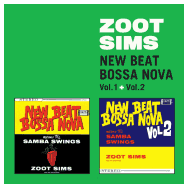 Zoot Sims "New Beat Bossa Nova, v.1-2" (American Jazz Classics, 2013)
Zoot Sims "New Beat Bossa Nova, v.1-2" (American Jazz Classics, 2013)

A nice reissue of two albums jazz saxophonist Zoot Sims released on the Colpix label in 1962, during the first rush of the global bossa nova craze. It's fun, sweet, poppy jazz, half bop/half cool, with varying degrees of Brazilian-ness -- it's certainly not as deep or as authentic as what Charlie Byrd and Stan Getz came up with, but it's nice anyway, closer to Bud Shank's earlier Braz-jazz crossovers of the '50s. Guitarist Jim Hall backs Sims on both records, and while Sims generally keeps a low profile and keeps it pretty cool, Hall does go off on a few noodly tangents and improvs though several rather standard-issue, North American-style jazz riffs. It's not unpleasant, it's just not quite the way the Brazilians were doing things, back when the bossa was still all about minimalism and restraint. The first album had more genuine Brazilian material in the set list, but both records are easy on the ears, and this disc is well worth checking out, particularly as a budget-priced twofer!
![]() Benjamin Taubkin & Adriano Adewale "The Vortex Sessions" (Adventure Music, 2013)
Benjamin Taubkin & Adriano Adewale "The Vortex Sessions" (Adventure Music, 2013)

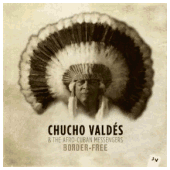 Chucho Valdes "Border Free" (Jazz Village, 2013)
Chucho Valdes "Border Free" (Jazz Village, 2013)


(Produced by Chucho Valdes)
A challenging, often difficult jazz set from Cuban pianist Chucho Valdes, son of the legendary descarga pioneer, Bebo Valdes. Here, Valdes pursues a more hard-edged jazz orientation, with swift, aggressively note-heavy solos and Afro-Cuban percussion that has been pushed into more avantnik forms. There are interesting counterpoints, particularly with divergent rhythms and malleable time signatures, as well as skillful ensemble work with tightly-arranged tempo changes, led by Valdes' ivories. It's not really my cup of tea -- too athletic a performance, and not enough lyricism for me, and not old-school Latin enough as well -- but many hardcore jazz fans will find this pretty compelling. Branford Marsalis guests on three of the tracks, including a version of Margarita Lecuona's classic "Tabu," given a modernistic update by this crack ensemble.
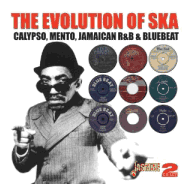 Various Artists "THE EVOLUTION OF SKA: CALYPSO, MENTO, JAMAICAN R&B AND BLUEBEAT" (Jasmine, 2013)
Various Artists "THE EVOLUTION OF SKA: CALYPSO, MENTO, JAMAICAN R&B AND BLUEBEAT" (Jasmine, 2013)


A swinging, well-structured 2-CD set showing the evolution of Jamaican reggae from its roots in earlier styles such as calypso and mento, and later in the incorporation of American-style jump blues and '50s rock'n'roll. Disc One covers the earlier material, kicking off with several delightful mento songs -- the style resembles calypso, but with a wilder, unruly edge and different instruments, notably the banjo, as well as amplified guitars. Perhaps the greatest gem on this collection is Count Sticky's "Chico Chico" which features an insanely grungy, wildly distorted electric guitar -- this track is completely nuts, and sure to be one of the most frequently played songs in any shows I do in the future. It's wild. Things calm down quickly, though, as the collection hones in on the influence of American rock and R&B. These relaxed, bluesy tracks -- both vocal songs and instrumentals -- contain the roots of the ska and reggae backbeats, and the compilers do a good job showing this progression, as the backbeat gets heavier and more defined, eventually becoming the central aspect of all Jamaican music. It's a precise demonstration, though not a concise one: like the countless Trojan Records compilations that precede it, this collection gets a little repetitious and is probably best taken in small doses. Disc Two focusses on the growth of bluebeat and ska, and here more familiar names emerge, such as Laurel Aitken, Byron Lee, Derrick Morgan and Jimmy Cliff, early '60s artists who would emerge as the elite of Jamaican pop in the decade to come. This collection spans the five years between 1956-61 and gathers together a lot of rare material, crafting a cohesive picture of how Jamaican pop evolved in this crucial era... I wish they had included more mento, though -- it's harder to find and the promise of hearing more of this style is what drew me to this album. Still, if you're new to the early ska scene and want to get some historical grounding, this is a great place to start.
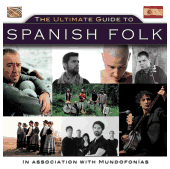 Various Artists "THE ULTIMATE GUIDE TO SPANISH FOLK" (ARC Music, 2013)
Various Artists "THE ULTIMATE GUIDE TO SPANISH FOLK" (ARC Music, 2013)


A variety of regional Spanish folk styles given brash modern arrangements by a panoply of contemporary artists, none of whom I've heard of before... Many of these performances seem a bit cluttered and crazed to me, but the business of the music may be inherent in the original traditional styles, I'm not really sure. This collection includes basque music, songs from Galicia, Aragon, Valencia, Madrid, the Sephardic Jewish tradition and various island communities. Some of the sounds are familiar to world music fans, such as the Celtic influence on "Neskato Gazte Tronpatia" by the Basque group Aintzina and "Levou-se a fremosa," by the group Doa, one of the few artists I recognize on this wide-ranging and frequently challenging collection. Other standouts include the delicate-yet-manic acoustic number, "La Tia Canaria" (from the Canary Islands) and "Biella Nuei" and the unusual, Arab-influenced "Coiros 86" by Pan De Capazo, which closes the album out. These updated versions might be complimented by more old-school collections such as Heritage Music's 1996 "VOICE OF SPAIN" compilation, which presents vintage recordings of some similar material, unadorned by modern instruments.
New To Me...
 Connie Evingston "Sweet Happy Life" (Minnehaha Music, 2012)
Connie Evingston "Sweet Happy Life" (Minnehaha Music, 2012)


A North American view on the bossa nova revolution of fifty years past. Singer Connie Evingston bounds through several bright, perky English-language bossa nova covers, featuring translated lyrics by Norman Gimbel, who translated numerous Brazilian hits into English during the 1960's bossa nova boom, along with other Gimbel originals. He's the guy who translated "Girl From Ipanema" and other Tob Jobim compositions that many non-Brazilians will recognize as the versions that were '60s American jazz classics. This album is sweet and cheerful, but maybe a little too brisk and one-dimensional. It's cool to see Gimbel get honored for his work, but the original subtlety and elegance of Jobim and the other great bossa nova composers seems a little lost in the mix, though the other tracks, the Gimbel originals, seem to hold up a little better. Still, Evingston brings a lot of energy to these recordings that recalls the exuberance of the earliest bossa recordings, and cuts through the decades of formalism and stuffiness that followed. A nice treat for English speakers who want to get a whiff of what these songs were about, and not just how they sounded.
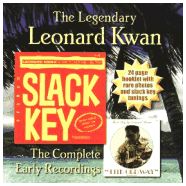 Leonard Kwan "The Legendary Leonard Kwan: The Complete Early Recordings" (Hana Ola, 2003)
Leonard Kwan "The Legendary Leonard Kwan: The Complete Early Recordings" (Hana Ola, 2003)


One of the pillars of modern Hawaiian music, slack-key guitarist Leonard Kwan is famous for his concise, soulful technique as well as for recording the first full album of slack-key instrumentals, back in 1960. That record, Slack Key (aka "The Red Album") is reissued in full here, along with a 1975 followup, The Old Way, both originally on the independent Tradewinds label. Also included are his earliest singles, from 1957, and a number of bonus tracks showing how Kwan established himself as one of Hawaii's subtlest accompanists. It's all gorgeous. The Red Album material, in particular, is impressive both for its restraint and for its depth: Kwan's style suggests as much as it reveals, laying down musical markers that he and others would develop for decades to come... In later years, Kwan came out of semi-retirement to record in a more modern setting with George Winston's Dancing Cat label, but these early recordings are elegant in their simplicity, and as beautiful as anything ever to come from the islands. A must-hear for any fans of the slack-key style.
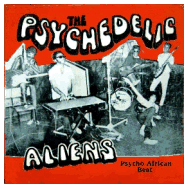 The Psychedelic Aliens "Psycho African Beat" (Academy Records, 2010)
The Psychedelic Aliens "Psycho African Beat" (Academy Records, 2010)


Cool vintage recordings of a Ghanaian band with an audacious mix of African funk and '60s-style American hippie rock -- soul rhythm riffs and soaring electric guitars worthy of a night at the Fillmore. Indeed, if it weren't for the African dialect, you'd be hard-pressed not to think that this was a board recording of one of the opening acts at a Big Brother & The Holding Company gig. This disc collects three rare singles that the band put out between 1970-71, gathered together courtesy of cratedigger Frank Gossner (of the band Squarepusher) who researched the group and found that several bandmembers were of non-Ghanaian backgrounds (perhaps explaining their affinity for American-style rock and soul...) The early songs are spaced-out jam sessions, without a lot of pop concision or melodic drive, but by time they recorded "Gbe Keke Wo Taoc," a clearer-cut, more aggressive, Fela-influenced Afrobeat sound emerges, although still with a little Summer Of Love twist. Not necessarily the most awesome Afro-pop ever, but definitely a nice time capsule... Nice to hear an entire album's worth of material by one of these long-forgotten bands, and not just have them sandwiched in on a compilation album.
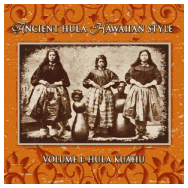 Various Artists "ANCIENT HULA HAWAIIAN STYLE" (Hana Ola, 2010)
Various Artists "ANCIENT HULA HAWAIIAN STYLE" (Hana Ola, 2010)


For real-deal Hawaiian authenticity, this collection of traditional Hula chants is pretty hardcore... It gathers rare recordings made in the 1930s, '40s and '50s on several local labels, and they are pure, unfiltered Hawaiian mele hula vocals, with minimal percussion and no extra ornamentations or European influences. The bulk of the material was recorded by two artists, Lokalia Montgomery and George Naope, who recorded respectively on the Waikiki and 49th State labels, along with a handful of other artists, all of whom exude authenticity and cultural purity. This probably won't work as casual, recreational listening for many people, but serious students of hula and Polynesian culture will be stunned. The album comes with a thick, well-written booklet, detailing each song and profiling the chanters, as well as giving a concise explanation of the role and meaning of the music. Highly recommended!
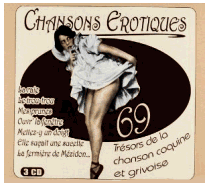 Various Artists "69 CHANSONS EROTIQUES" (Marianne Melodie, 2006)
Various Artists "69 CHANSONS EROTIQUES" (Marianne Melodie, 2006)


An impressive collection of risque, sexually suggestive songs from the glory days of French chanson, featuring naughty numbers from a number of cabaret stars, mainly less well-known artists who specialized in this sort of material. There's also a large batch of songs by the film star Fernandel (who, I'm guessing, may have released an entire album's worth of smutty songs at one point?) though mostly these are more obscure artists, such as Lyjo, Paul Lack, Sandrey, Dranen and others... This 3-CD set has sixty-nine songs (get it? sixty-nine?) all with the vintage 1930s/'40s sound of classic French chanson... Admittedly, a little bit goes a long way, and perhaps this big set of novelty songs will wear thin after a while... Or maybe not. But if you're in the market for a little old-fashioned Frenchie-style ooh-la-la, this compilation might be sort of a wet dream.



